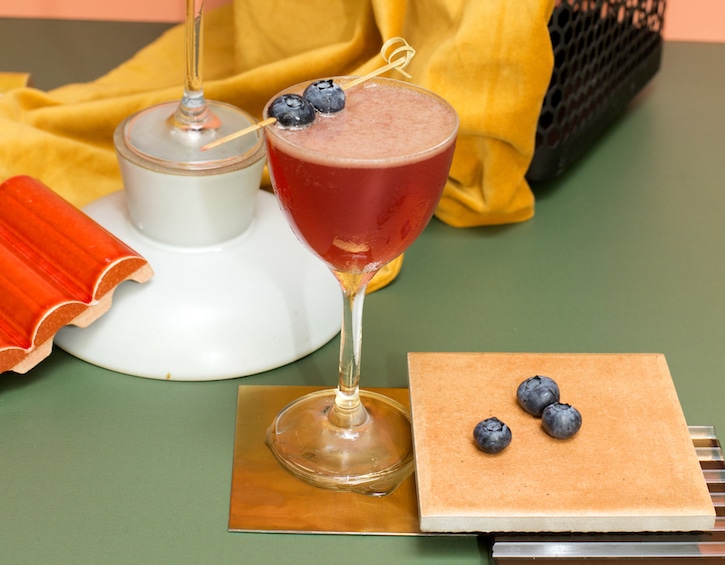
These mocktails are tried-and-tested.
So your little one is on the way… that doesn’t mean you have to give up making plans come Friday night! After a long day, when you’re hankering for some celebratory bubbles, a refreshing G&T or a relaxing glass of good wine, stay strong and opt for a delicious mocktail instead.
We’ve rounded up some of the top alcohol-free drinks being served up by the coolest bars in the 852. Don’t mock ’em till you try ’em…
Read more: How To Survive Summer When You’re Pregnant: Tips For Staying Cool
Mina House
Best known for its delectable desserts (perfect for those sugar cravings!), Mina House at The Peak also serves up some of the best mocktails in town. These Instagram-worthy beverages are colourful and captivating and sure to be a hit with all the mamas-to-be. Choose from the Plum Spritz with ginger ale and plum foam, the Berry Love – a blend of raspberry, strawberry and cranberry, topped with silky cream or the refreshing Osaka Sunset with passion fruit, pineapple, coconut and lemon.
Mina House, Shop G03, G/F & Shop 101, 1/F, Peak Galleria, 118 Peak Road, The Peak, Hong Kong, 2885 3320, www.thefoodstoryhk.com/minahouse
Le Garçon Saigon
To complement its vibrant Vietnamese cuisine, Le Garçon Saigon has a delicious array of “Les Innocents” to choose from. To get a true taste of the French influences that characterise Saigon, go for the Les Amoureux – a mix of mango, passionfruit and lemon, or the Saveurs de Saigon, which is made with Vietnamese lotus tea, lychee and mint.
Le Garçon Saigon, 12 Wing Fung Street, Wan Chai, Hong Kong, www.legarconsaigon.com
Jalan
Newly opened Malaysian street-food eatery Jalan is also a great place to go for a well-deserved mama mocktail! With libations ranging from the Granny’s Panties (lavender syrup, orange, cranberry, blueberry and rosemary) to the Jewelled Garden (Seedlip Garden, verjus and lychee syrup), you’re sure to find a suitable non-alcoholic substitute.
Jalan, 42 Peel Street, Central, Hong Kong, 2386 2216, [email protected], www.jalanhk.com
Honi Honi Tiki Bar
Hop to Hong Kong’s premiere Polynesian cocktail lounge, Honi Honi, where going without the booze is a breeze. Try the Designated Diver, which infuses orange juice with vanilla and a dash of passion fruit and lemon juice.
Honi Honi Tiki Bar, 3/F, Somptueux Central, 52 Wellington Street, Central, Hong Kong, www.honihonibar.com

Sip Song
Can’t quite escape on that tropical babymoon you’ve been dreaming of? Make your way to Sip Song in Repulse Bay and be transported to the beaches of Phuket, Krabi and Koh Samui without leaving Hong Kong island. Sip on a Thai Iced Tea or a lovely Lavender and Coconut Spritz and drink in the holiday vibes.
Sip Song, 1/F, The Pulse, 28 Beach Road, Repulse Bay, Hong Kong, 2328 8285, www.sip-song.com
Duddell’s
The mocktail menu at Duddell’s is perfect for a mama indulgence. Relax on the terrace and enjoy drinks that promise to provide relaxation, stress reduction and an overall sense of contentment according to the Japanese practice of Shinrin-Yoku (or forest bathing). Any excuse to relax sounds good to us!
Duddell’s, Level 3, Shanghai Tang Mansion, 1 Duddell Street, Central, Hong Kong, www.duddells.co

Bedu
For flavours from the Middle East, head to Bedu. The restaurant and bar serves up food and drinks inspired by the rich culinary traditions of the nomadic Bedouin tribes that wandered across the deserts of North Africa and the rocky sands of the Middle East. The affordable mocktail menu features several drinks that are sure to hit the spot. We like the sound of the Naenae – sweet green tea with mint (served hot or cold) as well as the Garden Party with homemade lime avocado curd, tomato water and lime.
Bedu, G/F, 40 Gough Street, Central, Hong Kong, www.bedurestaurant.com
La Petite Maison
Dreaming of carefree days in the French Riviera? We can’t help you with the airfare, but for a taste of the Niçoise region head to La Petite Maison in the H Queen’s building. Pick yourself up with a Vitamin Sea, pink grapefruit with flavours of rosemary and hibiscus or the Petit Coco with coconut water, sorbet and just a touch of citrus.
La Petite Maison, H Queen’s, 23-29 Stanley Street, Central, Hong Kong, 2887 1113, www.lpmlondon.co.uk/hongkong
Chaiwala
We’ve all heard that eating spicy curry at the end of your pregnancy can kick things along. Well, head to Chaiwala and wash it all down with a delicious selection of Indian-inspired mocktails. Don’t miss the Punjab Cadillac Colada Virgin with chai syrup, coconut and nutmeg or the refreshing Shikanji (pictured), with lemon juice, black salt, mint leaves and cumin.
Chaiwala, Basement, No. 43-55, Wyndham Street, Central, [email protected], www.chaiwala.hk
Editor’s Note: This article was originally published on 20, January 2017 by Annie Simpson and was updated on 17, October 2019 by Jess Mizzi.
 View All
View All


 View All
View All


 View All
View All


 View All
View All
 View All
View All







